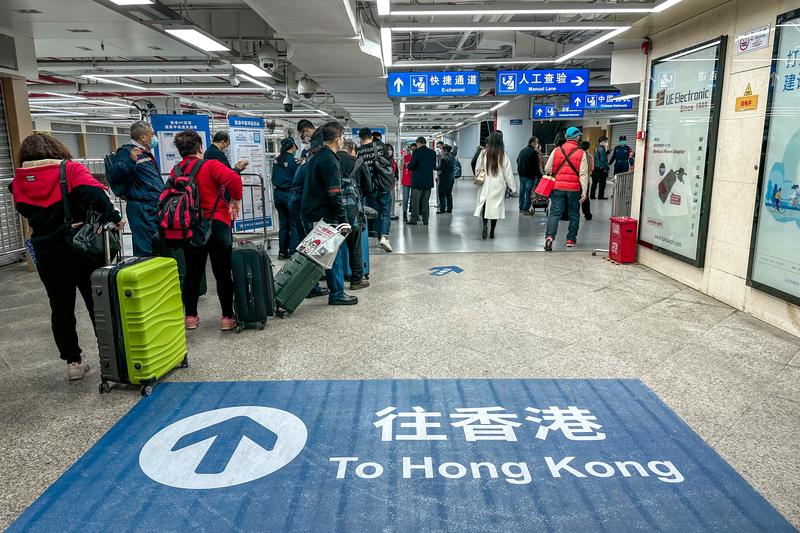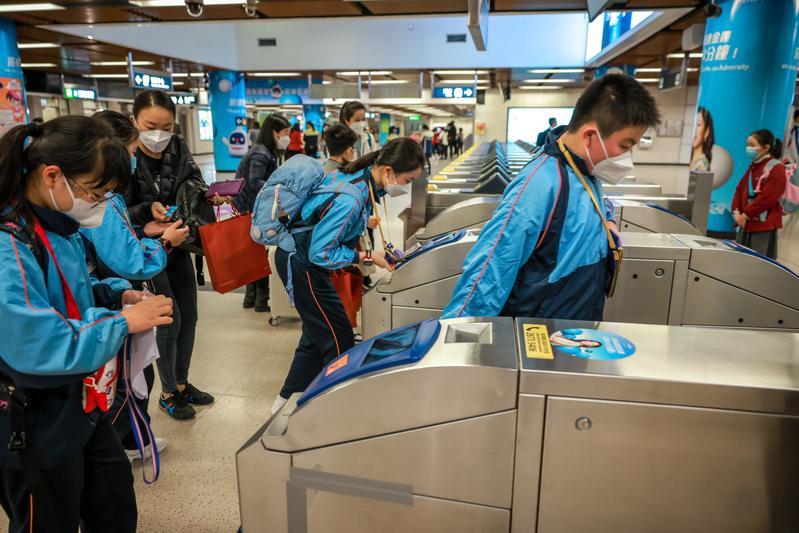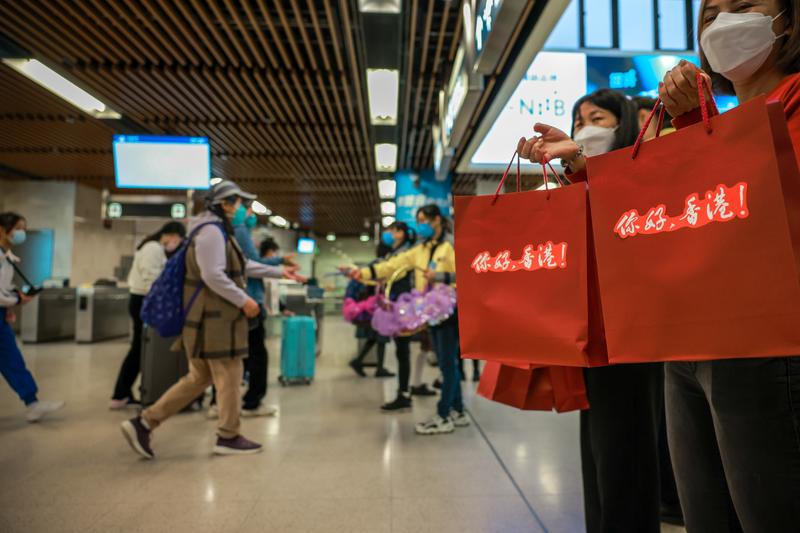 Visitors queue up to get their health declaration information vetted at the Luo Hu checkpoint, in Shenzhen, on Feb 6, 2023. (ANDY CHONG / CHINA DAILY)
Visitors queue up to get their health declaration information vetted at the Luo Hu checkpoint, in Shenzhen, on Feb 6, 2023. (ANDY CHONG / CHINA DAILY)
It’s something that has not been seen for more than three years.
Lo Wu woke up early Monday morning to witness again the rapturous crowds that had characterized the busiest cross-boundary checkpoint between the Hong Kong Special Administrative Region and the Chinese mainland before the pandemic.
The first day of the full resumption of normal travel between the SAR and the mainland saw tens of thousands of exhilarated Hong Kong travelers swarming across the control point to Shenzhen and beyond.
Some were overcome with emotion as they spoke of the travel restrictions that had barred them from seeing their families and loved ones since early February 2020 when COVID-19 struck and forced the shutdown of most of the checkpoints.
ALSO READ: Border fully reopens
In the opposite direction were young students living on the mainland who were returning to Hong Kong for face-to-face classes for the first time since the pandemic.
Tong said the resumption of normal travel now makes it more convenient for them to visit the SAR, and their son is eager to share a lot of interesting experiences with his dad
The full resumption of normal travel on Monday saw all the cross-boundary control points back in operation. The daily travel quotas and mandatory negative COVID-19 tests that were still required when the first phase of the resumption was launched on Jan 8 were scrapped.
According to MTR Corporation, about 22,000 cross-boundary travelers on the East Rail Line had passed through Lo Wu by noon on Monday.
After a rather painful three-year wait, mainland travel enthusiast Yang Pei could finally set off to explore the world again with her family and friends. She arrived in Hong Kong on Monday on her first overseas trip in three years. Before the pandemic, she used to travel abroad almost every year.
ALSO READ: Full travel resumption is big step to everyday life
Yang said she’s heading to Thailand with seven other family members and friends, and will stay in the SAR for two more days for shopping after returning from the “Land of Smiles”.
It took Yang and her family almost an hour to cross over to Hong Kong from Shenzhen. With a few luggage, Yang hoped they’ll be filled with goods after their trip.
For Hong Kong resident Tong Sze-ying, it’s the first time she has returned to the city since 2020 to be reunited with her husband.
 Shenzhen–Hong Kong cross-boundary students pass through the MTR barriers at Lo Wu station, in Hong Kong, on Feb 6, 2023. (ANDY CHONG / CHINA DAILY)
Shenzhen–Hong Kong cross-boundary students pass through the MTR barriers at Lo Wu station, in Hong Kong, on Feb 6, 2023. (ANDY CHONG / CHINA DAILY)
Amid the pandemic, Tong lived in Shanghai with her son, while her husband worked in Hong Kong. Their child, who’s in kindergarten, misses his father dearly and hopes his father can attend the parents’ meeting in school. But, Tong’s husband had visited them only a few times in recent years due to the travel restrictions.
Lau urged the relevant authorities to enforce further measures to divert the flow of commuters and provide easier passage for students entering Hong Kong from the mainland
Tong said the resumption of normal travel now makes it more convenient for them to visit the SAR, and their son is eager to share a lot of interesting experiences with his dad.
READ MORE: Full border reopening to welcome mainland visitors
Hong Kong resident Fung Suk-chun entered the mainland via Lo Wu to return home to see his parents. He has to look after his daughter, who’s studying in Hong Kong, and hasn’t been home for three years.
Fung said he chose Lo Wu because it’s faster and more convenient. He could take the East Rail Line directly to Lo Wu after the MTR cross-harbor railway section opened to the public in May last year, creating a direct transportation link among Hong Kong Island, Kowloon and the New Territories. He said he was thrilled and excited about the reopening of Lo Wu checkpoint as he can now go home every weekend.
Louis Wang Tianzi, 30, who works for a securities company in Hong Kong, took only 20 minutes to enter the mainland via Lo Wu. He said the popular checkpoint’s reopening means a lot to him as he has to visit Shenzhen every three days, and Lo Wu is much closer to his home in Shenzhen.
READ MORE: Travel links with SARs to fully reopen
Sidney Sin, director of communications at the Hong Kong Tourism Board, was at Lo Wu at 6am, distributing gifts to visitors as part of “Hello Hong Kong” -- a large-scale publicity campaign launched by the SAR government on Feb 2 to promote the city and attract tourists.
 Volunteers distribute gift bags to visitors arriving at Lo Wu station, in Hong Kong, on Feb 6, 2023. (ANDY CHONG / CHINA DAILY)
Volunteers distribute gift bags to visitors arriving at Lo Wu station, in Hong Kong, on Feb 6, 2023. (ANDY CHONG / CHINA DAILY)
The gifts included red bags printed with “Hello Hong Kong” on them, containing local snacks, theme park products, ticket coupons, beauty products, shopping mall coupons, and power adapters.
Several shops, including Circle K convenience store, Maxim’s Cakes and a currency exchange shop, are back in business at Lo Wu.
Each of the shops has about three workers. The staff at Maxim’s Cakes said they had been preparing for the shop’s reopening on Sunday. The store reopened at 9 am and had about five customers within an hour. At Colourmix -- a cosmetics shop -- many visitors bought face masks to take them to the mainland.
ALSO READ: Cross-border students back to school
Mia Lau, assistant shop manager at the Colourmix shop, said they began arranging staff to work and stocking up goods last week. She’s confident that business would improve following the full resumption of regular travel.
Lawmaker Lau Kwok-fan and three members from the North Branch of the Democratic Alliance for the Betterment and Progress of Hong Kong visited Low Wu early in the morning to inspect its operations.
Lau said it took him less than 10 minutes to get through the checkpoint, saying its operations had been smooth and convenient as it was before the pandemic.
During the morning rush hour, groups of cross-boundary students entered Hong Kong via Low Wu, while the Shenzhen side implemented crowd-control measures to facilitate their passage.
Lau urged the relevant authorities to enforce further measures to divert the flow of commuters and provide easier passage for students entering Hong Kong from the mainland.


